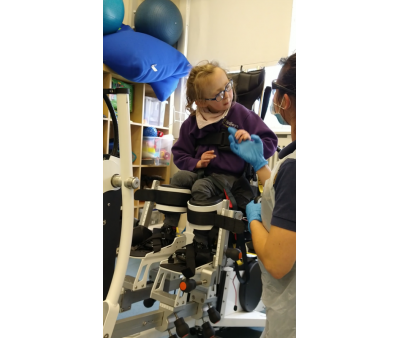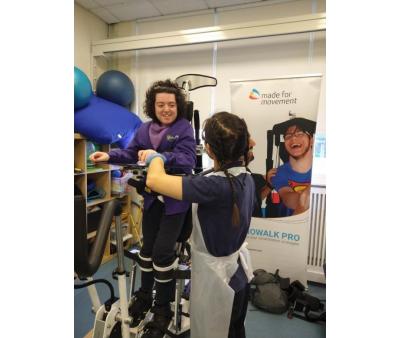This article was originally published in the APCP Newsletter on 21 March 2022
Trial of an Innowalk PRO within a Special School setting
Scope of Study
To look at the effectiveness and feasibility of the use of an Innowalk PRO within a Special School setting.
Background
Within Newcastle-upon-Tyne Paediatric Physiotherapy service the Innowalk PRO has already been shown to be successful with several patient cohorts across both acute and community settings with benefits including but not limited to: increased range of movement, improvements in mobility, safe early rehabilitation intervention as well as improved patient mental well-being. The Paediatric Community Physiotherapy team wanted to look at the feasibility of using an Innowalk PRO within a special school setting.
The Special School participating in the study was Northern Counties School. Attending this school are a wide range of pupils, including those with Profound and Multiple Learning Disabilities (PMLD), Hearing Impairment (HI) and Autism. The physiotherapy team wanted to trial the use of the Innowalk PRO within this setting to look at the impact on quality of life.
Innowalk PRO
The Innowalk PRO is made by Made for Movement and is a robotic dynamic standing device that allows for safe and comfortable movement in a weight bearing position. It provides children and adults with physical disabilities the opportunity to participate in dynamic standing and physical activity, which is extremely important for physical health and mental well-being. No independent ability to stand or walk is required, as the Innowalk PRO supports the user from sitting into a standing position, and provides assisted, guided and repetitive movements in a safe upright, weight-bearing position. It is quickly and easily adjusted between different users with a range of supports available for differing postural needs.
Children with disabilities often struggle for opportunities to access movement and exercise, and during the COVID pandemic these opportunities have become even more limited with less therapy input. Access to an Innowalk PRO allows children to access movements and postures that they may never have been able to achieve before and can have both long and short-term effects on health and well-being. Research has shown a number of benefits from Innowalk intervention including: increase in passive range of movement, decrease in spasticity (1), improvement in walking and weight-bearing, positive effects on bowel function as well as improvements in attention and sleep pattern (2).
NCS Innowalk PRO trial
What did we do?
A 4-week trial of both a small and large Innowalk PRO at Northern Counties School, this ensured full access for all pupils across the school regardless of age or size.
Full training was provided by the Made for Movement Team to all therapy and educational staff involved in the study.
Fifteen pupils participated in the study: with a variety of conditions including but not limited to: four limb cerebral palsy, Rhetts, hemiplegic cerebral palsy with autism, cerebellar hypoplasia and Emmanuel Syndrome.
The team gained verbal and written feedback from parents, staff and carers on patient well-being, bowel management and pupil behaviour. The therapy team also monitored effects on spasticity, muscle tone, dystonia, range of movement and how innowalk PRO provision could increase pupils ability to access light to moderate activity for the recommended time as per the World Health Organisation guidelines.
What was the Outcome?
The children thoroughly enjoyed the experience, and staff, therapists and parents could see a number of positive changes within the children.
General feedback suggested that access to the Innowalk PRO helped with bowel care (relievING constipation, wind and encouragING movement regularity) and also potentially gave short-term relief from dystonia with one patient. Other benefits included an increase in well-being and mood, as well as enabling pupils with limited mobility the option to experience a different way of moving whilst achieving light to moderate exercise. The team found some small increases in range of movement however, useful data was difficult to collect due to the trial being short-term. Access to the Innowalk PRO definitely enabled this cohort of patients an increased ability to access light to moderate exercise in a safe way. The most exciting experience for staff was seeing the joy and excitement these children found during the experience which then carried over into their day in the classroom.
Parent feedback was very positive with parents thoroughly enjoying watching their children have access to a quality freedom of movement that can be provided alongside sensory, learning and patient activities, providing such a beneficial life experience. It was particularly great for this cohort of children to be able to access this equipment within the ongoing pandemic when so many treatment options have been limited.
As stated, the team were unable to collect meaningful statistical data due to the short-term limitations of the trial. However, the feedback was so positive that the school, along with parents and staff at the Percy Hedley Foundation have managed to purchase two Innowalk PROs through fundraising.
The trial has been a very positive experience for the children, staff and parents and highlights how much benefit Children and Young People have from regular access to movement and exercise. EVERYONE SHOULD HAVE THE OPPORTUNITY TO MOVE and these children are no different.
Pupil Stories

April has Emmanuel syndrome, with global developmental delay and complex cardiac background. She has been unable to weight bear through her legs for several years due to fixed flexion deformities at her knees. She has been unable to access hydrotherapy due to cardiac and open stoma concerns. The Innowalk PRO provided April with continuous movement in her legs that she has not previously experienced and allowed her to gradually start to bear weight through her legs. She was fascinated watching her legs move.

Bex has Rhetts and at 18 is still mobile, which is a great achievement. Anything that can keep her on her feet is beneficial to quality of life, however as is often the case with these patients, she is anxious when it comes to trying new things. Initially the Innowalk PRO was no different until she got going. Bex smiled and tapped on her tray to let us know she was enjoying it. She quickly found it easier to relax in subsequent sessions and danced whilst working on her strength and mobility as well as communication.
What Happens Next?
Northern Counties will are the first special school in the North of England with access to this therapy. With school support, the physiotherapy team will look at integrating the use of the Innowalk PRO into the pupils’ daily routine within school.
The team are going to look at developing a project across both their special school and mainstream patients that will aim to look at how use of the Innowalk can effect both the mental and physical health of children with cerebral palsy. They will look to carry out a 6 week intervention in a school and community setting with possible measures to be looked at including: CPIP, 3 metre walk test, Care and Comfort questionnaire and Patient Quality of Lift questionnaire; as well as taking into account the new published guidelines looking at physical activity for disabled children and young people.
Written by Rosalind Middleton (Advanced Paediatric Physiotherapist, Newcastle Upon Tyne Trust), Jen Ferguson (Territory Manager, Made for Movement), Caitlin Brown (Paediatric Technical Instructor, Newcastle Upon Tyne Trust)
1. Non-ambulatory children with cerebral palsy: effects of four months of static and dynamic standing exercise on passive range of motion and spasticity in the hipAsa B. Tornberg, Katarina Lauruschkus (March 17, 2020)
2. Effect of assisted walking-movement in patients with genetic and acquired neuromuscular disorders with the motorised Innowalk device: an international case study meta-analysis Caroline Schmidt-Lucke, Jana Käferle, Britt-Marie Rydh Berner, Lotta Ahlborg, Hege Marie Hansen, Ulrika Skjellvik Tollefsen, Tonje Thon, Rikke Damkjær Moen, Ana Pekanovic,, Asa B. Tornberg, Katarina Lauruschkus (June 18, 2019)
